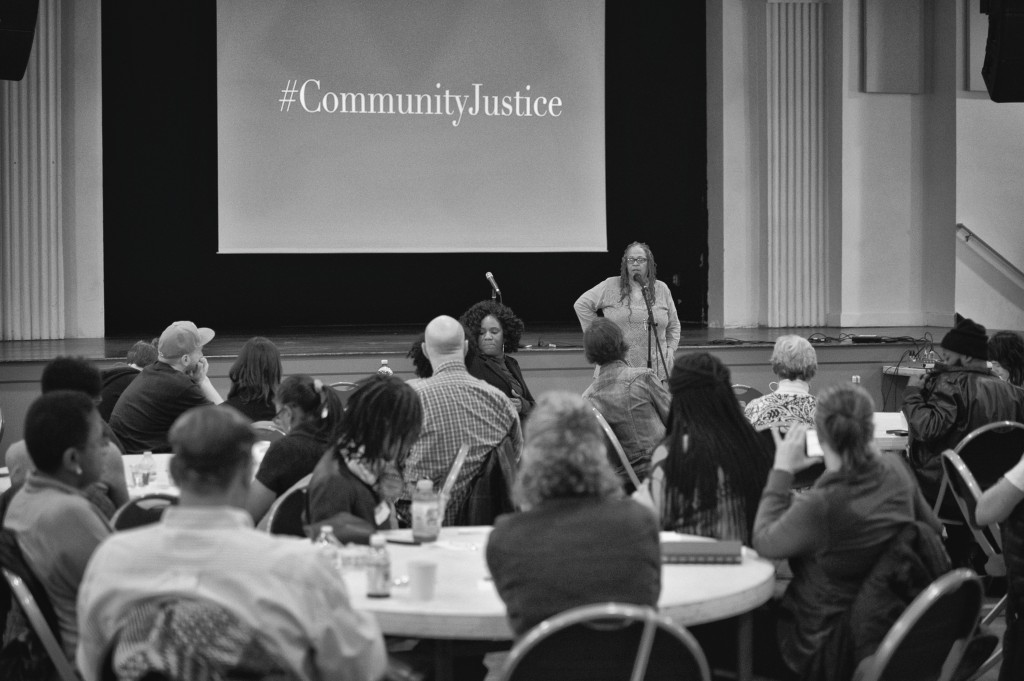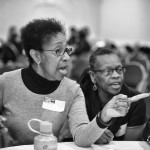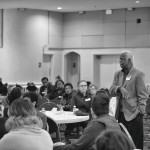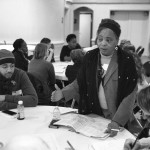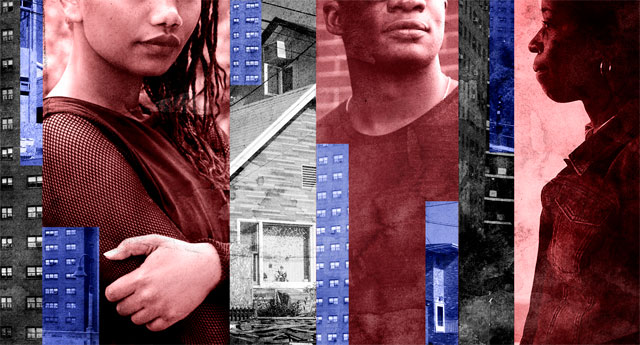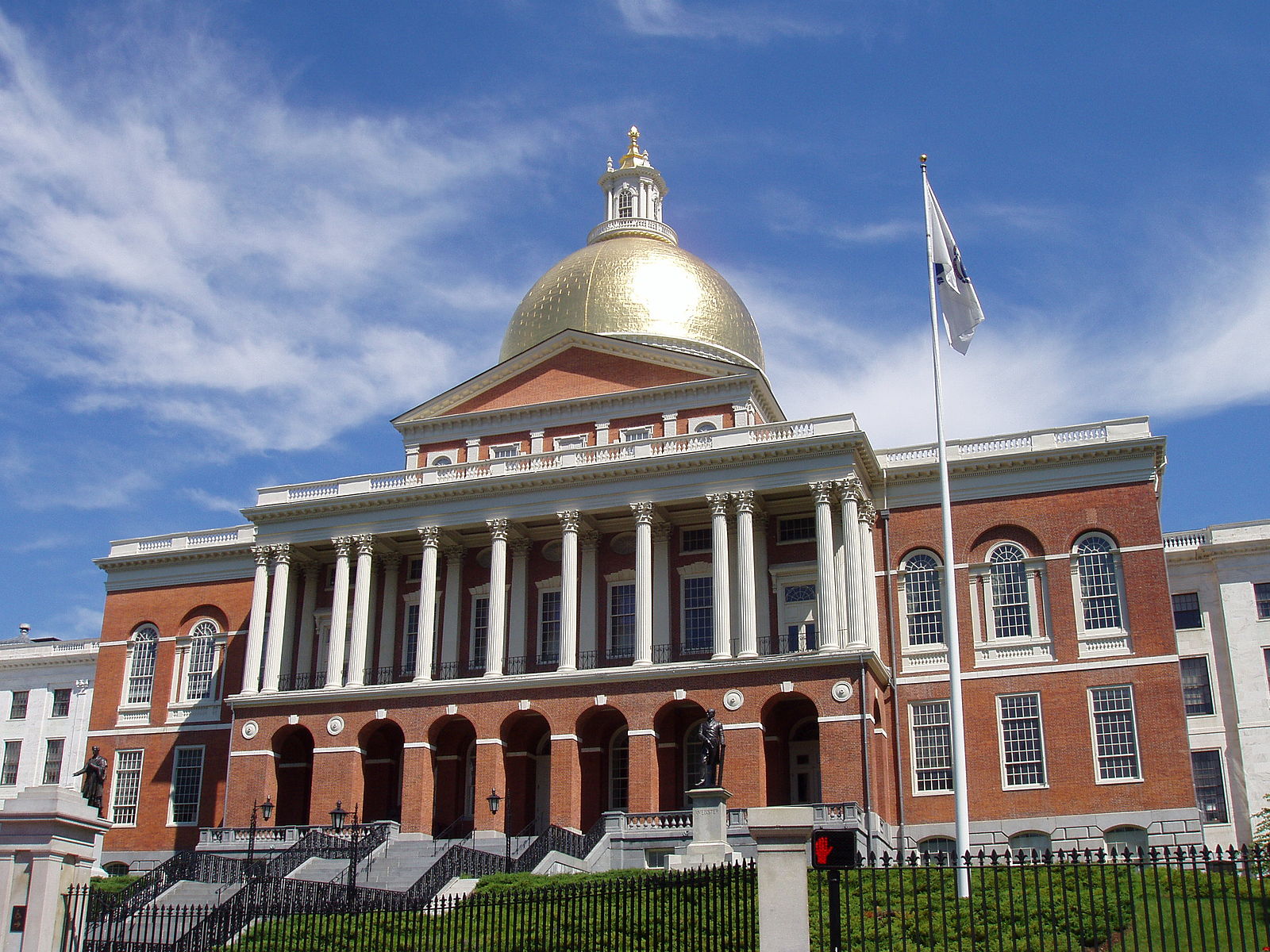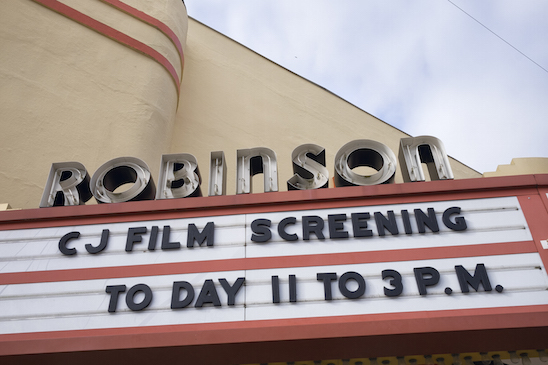
All Photos by Christopher “Puma” Smith, Feb. 17, 2018.
Robinson Theatre, Richmond Virginia
Last month I had the opportunity to witness a powerful experience in group organizing. I saw, first-hand, how film is a tool that can engage the mind, move the heart, and lead to action. But as much as that, and believe me, that was already unexpected and exciting, I saw how trusting one’s community and soliciting voices of all members is an unbeatable way to engage people in their welfare. As community strategist Lillie A. Estes says, conversations need to happen to “get people to step into their community power….The community must resume its rightful place in the establishment and or re-establishment of how our communities grow.”
On February 17th, 2018, I attended the Community Justice Film Series (CJFS) in Richmond, Virginia, part of an initiative co-founded by Estes to engage Richmond in action-oriented conversation. I have written about Lillie Estes here and here after we first met at Harvard’s Charles Hamilton Houston Institute of Race & Justice (CHHIR&J) in October, 20i7. This is also where I first learned the concept of “community justice.” Per CHHIR&J, “It is a call for the active participation of communities that have, for too long, been largely dismissed in policy discussions that directly affect their health and well-being.”
Before this event, community leaders had met, blogged, written articles, participated in meetings, and taken actions to get engagement of more community voices. On October 25, Michelle Saka El persuasively blogged to answer the question “Is CJFS entertainment or education?“ Her response was educational if “forward-thinking action” is added to the mix, in order to “stop our oppression by government at all levels, institutions and even the oppression of ourselves.” She listed CJFS planning committee suggestions for action after and between each film event.
- “Have ongoing house gatherings to keep your circle together around the justice themes you are working.
- Post a blog or create a log/diary of the things you learned everywhere, your thoughts or ideas on social, political, and economic justice.
- Create an alert call/ email list of at least five to ten people involved with the theme after each film or activity associated with the theme(s).
- Host an activity associated with the theme event you attended and share it with CJFS planning committee.
- Commit to working on an ad hoc committee of one or more of the film theme(s).
- Make a list of little known facts about the community justice theme(s) that you learned to share with all.
- Tell your story, record your struggle and journey to justice, freedom, equality, and inclusion. Video and audio record your efforts the meetings, presentations, protests, everything.
- Research and consider running for office and boards share the information.
- Create and or sponsor/co-sponsor at least one activity for children of all ages on social justice awareness.
- Sponsor senior citizen activities especially those living in low income housing that put them in touch with their representatives, i.e, post card mailings to legislators and local officials.
- No one can do everything for themselves, but we all can do something that helps everyone in our community.”
Lillie A. Estes, introducing the final film of the CJFS on Feb. 17.
The series of six films in the CJFS took place over an eighteen month period, which reflects how deliberately the organizers went about this process. Estes says the process began in the fall of 2014, after Michael Brown’s death, and after crisis after crisis in her community–from housing accessibility and affordability to a lack of viable transportation and a disproportionate impact of violence on those who live in public housing. At one point, during a particularly cold spell, tenants of the Richmond Redevelopment Housing Authority (RRHA) slept in layers of coats and blankets as thick sheets of ice formed on interior walls. Families heated their homes with their ovens, and residents given space heaters by RRHA were charged for electrical use overages.
With issues as crucial as these, concerned members of the community have been coming together through this film series to demand that their voices be heard to solve city problems. The choice of films reflected hot-button issues that the planning committee felt needed addressing—education, public safety, whole body-well being, transportantion, housing, wealth creation, and job building.
The final documentary shown on February 17 was Against All Odds: the Fight for a Black Middle Class, It explores the often “heroic efforts of black families to pursue the American dream in the face of unrelenting barriers.” Featuring journalist Bob Herbert, the film “connects the dots of American history to reveal how the traditional route up the economic ladder by attaining a job that pays a living wage and then buying a house — is a financial ascent that has been systematically denied to black families.” The documentary tackles injustices such as reduced educational opportunities, rampant employment discrimination, mortgage redlining and virulent housing segregation, all converging to limit the prosperity of black families from generation to generation.
This documentary was used to explore the theme of job creation and wealth building, and it provoked wonderful conversation and important insights that came out in small group discussions after the film. Facilitators raised questions such as “Do you believe the American Dream was ever achievable for Black people?” And community members gave answers such as “The so-called American dream has never really worked for Black Americans because Blacks are not respected, but Blacks need to create their own American dream;” or “Certain folks had a head start…There is an intentional war on the poor.”
At the end of the afternoon, after lunch and talk had subsided, facilitators reported back on the conversations from their groups. Some discussions included “considering entrepreneurship and not just jobs;” “teaching people how to fish and not just giving them fish;” “the need to build more security into the labor system;” “the recognition that home ownership is important to building wealth:” “reparations;” “healing from trauma;” and “having block parties to build community.” The participants were clearly energized. It was clear that this was far from the end of the process.
Stay tuned here as I explore more uses of film across the country to promote justice and the next steps for the CJFS. My final comment: The Community Justice Film Series in Richmond should be a model across the country.

